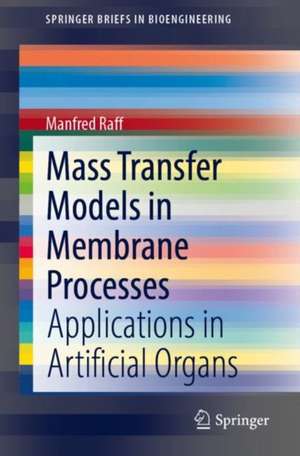Mass Transfer Models in Membrane Processes: Applications in Artificial Organs: SpringerBriefs in Bioengineering
Autor Manfred Raffen Limba Engleză Paperback – 28 noi 2021
This book serves as an introduction on mass transfer models in membrane processes, with a special focus on their applications in Artificial Organs. Various such models are discussed while multiple easy to use module equations are presented, enabling readers to gain basic knowledge of the mass flow of toxins across membranes. This is particularly interesting to membrane manufacturers who may use these equations to improve the relation of module performances and production costs. Additionally, examples which specialize on artificial organs, but in principle can be applied to analogous environmental, food and biotechnology processes- are analysed. This book will appeal to readers who want to understand how membrane modules and processes can be optimized and will be a great tool for graduates, researchers and professionals working in this field.
Preț: 451.87 lei
Preț vechi: 475.65 lei
-5% Nou
Puncte Express: 678
Preț estimativ în valută:
86.46€ • 90.28$ • 71.56£
86.46€ • 90.28$ • 71.56£
Carte disponibilă
Livrare economică 14-28 martie
Preluare comenzi: 021 569.72.76
Specificații
ISBN-13: 9783030891947
ISBN-10: 3030891941
Pagini: 70
Ilustrații: XI, 70 p. 35 illus., 33 illus. in color.
Dimensiuni: 155 x 235 mm
Greutate: 0.13 kg
Ediția:1st ed. 2022
Editura: Springer International Publishing
Colecția Springer
Seria SpringerBriefs in Bioengineering
Locul publicării:Cham, Switzerland
ISBN-10: 3030891941
Pagini: 70
Ilustrații: XI, 70 p. 35 illus., 33 illus. in color.
Dimensiuni: 155 x 235 mm
Greutate: 0.13 kg
Ediția:1st ed. 2022
Editura: Springer International Publishing
Colecția Springer
Seria SpringerBriefs in Bioengineering
Locul publicării:Cham, Switzerland
Cuprins
Introduction.- Membranes and modules.- Mass transfer models across membranes.- Membrane processes in artificial organs.- Conclusion.
Notă biografică
Manfred Raff spent his professional life focusing on membrane technology. He started his career with a project at Stuttgart University working on improving dialysis monitors. His PhD-thesis dealt with the video screening of electropherograms of proteins in plasma and cerebrospinal fluid, using different electrophoretic separation techniques with different kinds of membranes. His industrial experience began with the development and production of plasmafilters and continued with improving membranes and modules for hemodialysis and oxygenation. After 10 years in industry he received an appointment as a professor at Furtwangen University, teaching courses specializing on thermal and mechanical process engineering and on membrane technology. During his research career -and always in collaboration with industry- Prof Raff investigated multiple topics focusing on measuring the pore size distributions of ultrafiltration membranes, studies of mass transfer in highflux-hemodialysis, artificial liver, blood oxygenation and plasmapheresis. After retiring, he continued working as a guest lecturer for Artificial Organs at different universities.
Textul de pe ultima copertă
This book serves as an introduction on mass transfer models in membrane processes, with a special focus on their applications in Artificial Organs. Various such models are discussed while multiple easy to use module equations are presented, enabling readers to gain basic knowledge of the mass flow of toxins across membranes. This is particularly interesting to membrane manufacturers who may use these equations to improve the relation of module performances and production costs. Additionally, examples which specialize on artificial organs, but in principle can be applied to analogous environmental, food and biotechnology processes- are analysed. This book will appeal to readers who want to understand how membrane modules and processes can be optimized and will be a great tool for graduates, researchers and professionals working in this field.
Caracteristici
Provides easy module equation for mass flow of toxins across membranes Analyzes examples which specialize on Artificial Organs Contains quality graphics to facilitate better understanding













